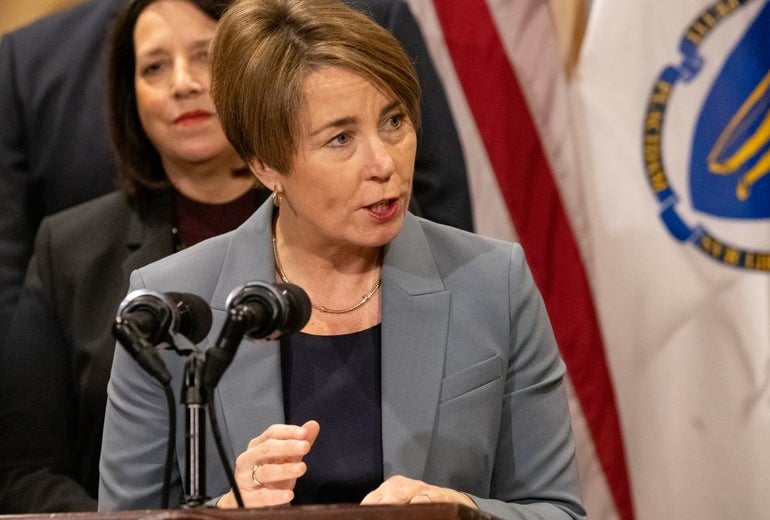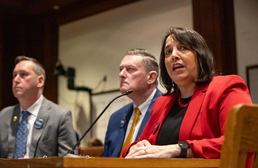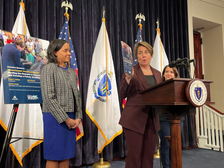HERO Act seeks expanded support for women, disabled, and LGBTQ+ veterans
 Photo | Courtesy of State House News Service
Massachusetts Governor Maura Healey
Photo | Courtesy of State House News Service
Massachusetts Governor Maura Healey
LGBTQ+ veterans would have increased access to fertility treatment and the state would study the use of psychedelic mushrooms in treating veterans' mental health disorders under legislation Gov. Maura Healey filed on Thursday, which seeks to expand veterans' access to health care and increase their financial benefits.
Filed ahead of Veterans Day on Saturday, the governor's omnibus bill -- which she dubbed the Act Honoring, Empowering and Recognizing Our Servicemembers and Veterans, or HERO Act -- includes 17 spending, policy and tax initiatives that, among other things, seek to provide support particularly for women, disabled and LGBTQ+ veterans.
Among the policies, Healey's bill would launch a pilot program to reimburse same-sex couples who use in-vitro fertilization to have a child.
The U.S. Department of Veterans Affairs covers IVF procedures for certain veterans with service-connected conditions that result in infertility, but current VA and Department of Defense rules exclude people who are unmarried or in same-sex couples from infertility coverage.
Healey's pilot program for IVF reimbursement would be the first step in expanding benefits for LGBTQ+ veterans.
The bill would also launch a working group to explore "long-term solutions in response to the federal policy excluding same-sex couples."
A lawsuit making its way through federal courts would push the U.S. agency to cover the assisted reproductive treatment. LGBTQ+ and unmarried veterans are suing the VA for "discriminatory and arbitrary" policies.
Healey's bill would also expand the scope of the Veterans Equality Review Board beyond "Don't Ask, Don't Tell" discharges, the administration said, to include discharges related to military sexual trauma, post-traumatic stress disorder, traumatic brain injury, mental health conditions or HIV discharges.
"By promoting inclusivity and expanding benefits, we're not only showing our gratitude to veterans but also addressing their evolving needs," Lt. Gov. Kim Driscoll said in a statement. "This legislative package represents a significant step forward in the care and support we provide to our veterans, particularly for women and LGBTQ+ veterans."
The bill would also revise veterans affairs statutes to use gender-neutral language.
There are nearly 30,000 women veterans and thousands who identify as LGBTQ+, according to the governor's office.
Veterans also would have expanded access to behavioral health treatment and increased financial benefits under Healey's bill.
She is proposing seven initiatives to expand benefits, including allowing veterans to be reimbursed for visits to outpatient behavioral health providers, and increasing the annual annuity payments for veterans with a service-connected disability, surviving spouses, or Gold Star parents who lost their children in military service, from $2,000 to $2,500.
Additionally, the bill would increase a tax credit for small businesses that hire unemployed or low-income veterans to $2,500. Eligible veterans include those receiving SNAP benefits, "chronically unemployed veterans," and unemployed veterans who are disabled.
Cities and towns would also have two new local options for veterans property tax exemptions: to double the tax exemption without doubling all other exemption clauses, or to tie the annual property tax abatement amount to inflation, allowing exempted property tax amounts to increase with inflation.
The bill seeks to broaden the state's legal definition of a veteran, to allow more people to be eligible for annuity and other benefits.
It would align Chapter 115 -- the state's veteran benefits/safety net program -- with the VA's definition, which covers a wider-range of servicemembers. Under the change, more veterans would also have access to Massachusetts' veterans homes. It would also expand the definition of a veteran dependent, to extend benefits to family members other than those currently listed, who include wives, husbands, widows, widowers, children, mothers and fathers.
The legislation also seeks to lengthen the timeframe for veterans in public service to participate in the Active-Duty Service Buyback program, and allow retroactive participation for veterans who missed the buyback opportunity. The program would enable veterans to purchase up to four years of active-duty service time toward their state retirement.
As for behavioral health, the bill would also establish a working group to study "alternative therapies" -- such as psilocybin, or psychedelic mushrooms -- in treating veterans suffering from mental health disorders.
There are also provisions to codify dental and medical assistance benefits, and to give the Executive Office of Veterans Services the authority to administer and maintain the state's two memorial veterans cemeteries.
In a release from the governor's office on Thursday, representatives from Massachusetts Veteran Service Officers, Massachusetts Veterans of Foreign Wars, Bilingual Veterans Outreach Center, the New England Chapter of Blue Star Families, the Veterans Advocacy Coalition and other organizations expressed their support for the bill.
The job of veterans' services secretary became a full Cabinet-level position under a 2022 reform law earlier this year, with Secretary Jon Santiago the first to serve in the executive office role.













0 Comments